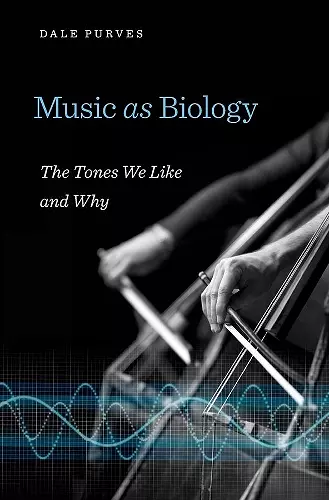Music as Biology
The Tones We Like and Why
Format:Hardback
Publisher:Harvard University Press
Published:1st Feb '17
Should be back in stock very soon

The universality of musical tones has long fascinated philosophers, scientists, musicians, and ordinary listeners. Why do human beings worldwide find some tone combinations consonant and others dissonant? Why do we make music using only a small number of scales out of the billions that are possible? Why do differently organized scales elicit different emotions? Why are there so few notes in scales? In Music as Biology, Dale Purves argues that biology offers answers to these and other questions on which conventional music theory is silent.
When people and animals vocalize, they generate tonal sounds—periodic pressure changes at the ear which, when combined, can be heard as melodies and harmonies. Human beings have evolved a sense of tonality, Purves explains, because of the behavioral advantages that arise from recognizing and attending to human voices. The result is subjective responses to tone combinations that are best understood in terms of their contribution to biological success over evolutionary and individual history. Purves summarizes evidence that the intervals defining Western and other scales are those with the greatest collective similarity to the human voice; that major and minor scales are heard as happy or sad because they mimic the subdued and excited speech of these emotional states; and that the character of a culture’s speech influences the tonal palette of its traditional music.
Rethinking music theory in biological terms offers a new approach to centuries-long debates about the organization and impact of music.
The book Music as Biology: The Tones We Like and Why comes from Duke University professor Dale Purves, a world-renowned scholar of the neuroscience of sensory systems. A scientist known for thinking ‘out of the box,’ Purves covers the range from an overview of the human auditory system to the emotional and aesthetic qualities of music. Its readership definitely will not be limited to scientists and, in fact, the book could be enjoyed by any educated person. -- Donald Pfaff, author of Brain Arousal and Information Theory
In this engaging and lucidly written book, Dale Purves makes the important case that we can never fully understand music and the way it affects us without understanding its ecological context and origins. These, he argues, lie in human vocal communication, with the characteristics of music and our reactions to them having been shaped by natural selection. This perspective, supported by a concisely marshaled battery of evidence, is a timely complement to evolutionary approaches to the origins of music and should stimulate valuable debate and research. -- Iain Morley, University of Oxford
ISBN: 9780674545151
Dimensions: unknown
Weight: unknown
176 pages